Hong Kong Can Refuse U.S. Extradition Requests
As I noted last night in connection with the case of Edward Snowden, the United States does not have an Extradition Treaty with the People’s Republic of China, but does have one with Hong Kong that was entered into about two years prior to the city’s 1999 turnover to Chinese control by the British. As it turns out, though, that treaty effectively gives China veto power over any extradition request:
Hong Kong could refuse to extradite US whistleblower Edward Snowden if Beijng wanted to keep him, according to a treaty signed between the United States and Hong Kong almost two decades ago.
Hong Kong has the “right of refusal when surrender implicates the ‘defense, foreign affairs or essential public interest or policy'” of the People’s Republic of China, according to the US-Hong Kong Extradition Treaty signed in 1997.
Snowden chose to seek refuge in Hong Kong because of the city’s “strong tradition of free speech”, he said in an interview with theGuardian published earlier today. He also said that he was concerned about being handed to mainland Chinese or US authorities.
The US justice department has initiated an investigation into his leaking of a secret US data gathering programme, that has collected records of trillions of online messages and phone calls over several years. US members of congress have already called for his extradition to the US to stand trial.
China does not have an extradition treaty with the United States.
According to notes on the treaty submitted to the US Senate, the Hong Kong negotiators had insisted on including clauses making it easily possible to deny extradition to the US, arguing that such a clause was essential in obtaining mainland Chinese approval for the treaty.
As such, article 3 of the treaty allows the Chinese government to refuse surrendering a person if it thought the surrender “relates to (its) defense, foreign affairs or essential public interest or policy”.
Hong Kong can also refuse if the city or the mainland have begun proceedings for the prosecution of that person. Hong Kong can reject an application if the city felt that the request was “politically motivated” or that Snowden would be prosecuted for his political opinions
Many people have commented since last night on this matter and expressed some skepticism about Snowden’s reasoning for choosing Hong Kong as his place of apparently refuge for at least the foreseeable future. Based on these provisions of the applicable treaty, it would appear that he may have made a fairly wise choice as far as his own personal safety is concerned. Of course, the other side of the coin is that the Chinese themselves may be interested in talking to Snowden, and in that situation there’s not going be much the US can do to protect him.

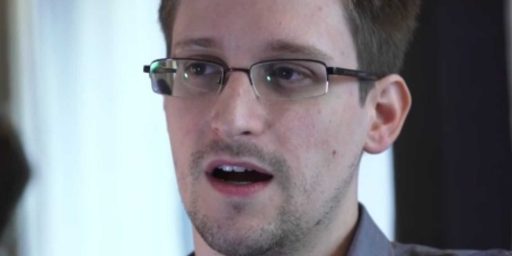
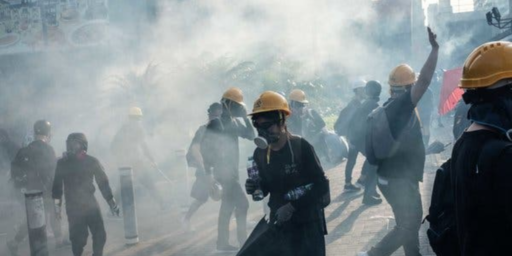
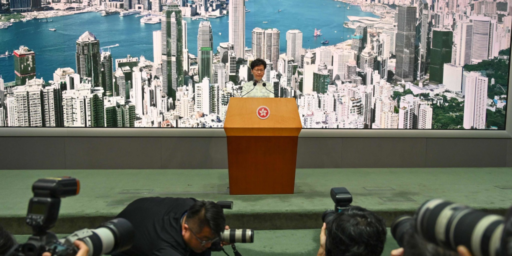
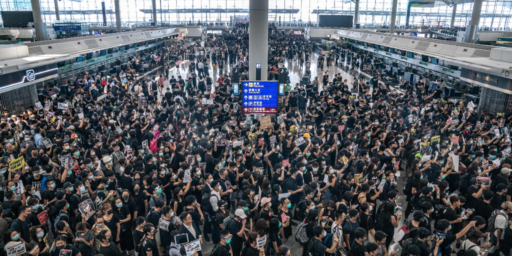
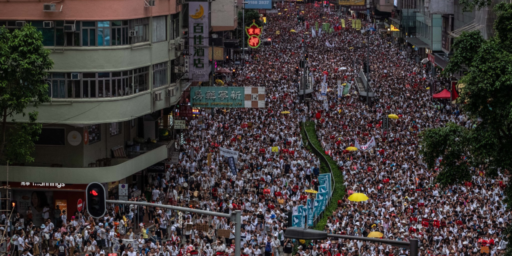
By my reading that only applies to nationals – meaning it’s a limit on extraditing a Hong Kong or PRC national to the US and vice versa.
If China wants to talk to Snowdon, it is not going to go GITMO on him. It will be with a lot of sweet offers about jobs in China, a life of luxury, maybe a Chinese girlfriend to keep him busy, etc.
I find it very hard to imagine HK doing anything other than what the PRC tells them to do. It is a constant battle over there to retain any sort of independence. Why would they risk confrontation over an American?
1_) Extradition is almost ALWAYS a slow and complicated process. Most extradition treaties, including the one signed with Hong Kong have a pretty limited list of offenses that are considered extraditable offenses. Ronald Biggs, a train robber, lived for 30 years in Rio de Janeiro. Italy refused to extradite a Italian-Brazilian banker to Brazil*, and some years later Brazil refused to extradite a left-wing terrorist to Italy.
2-) Snowden will be fine if he stays out of the Commonwealth and of the EU. The United Kingdom has a pretty generous extradition treaty with the US, but that´s the exception.
3-) I doubt that the Chinese are worried about him. Hong Kong would be a problem if it was still a British protectorate.
-* Yup. Yes, even in Brazil bankers can go to jail.
You’re talking about the rule of _law_ here, Doug, and I think the entire reason Snowden went to ground in HK wasn’t law, but _politics_. He is damn near inside China’s grasp right now, but there’s no way they can get away with touching him now that he’s gone public. But by that same token, everything he does is going to be watched by them, and that means the US can’t get up to any hanky-panky (*cough*rendition*cough*) without it being seen by one & all either. It’s an incredibly dangerous game Snowden’s playing, but so far he’s playing it well. I’d be curious to know what his intended end-state is…
Frankly, about the worst thing that could happen right now is for some completely unintended freak accident, like slipping in the shower, to take Snowden down. Then we’d all have to find someone to point fingers at & save face by scapegoating…
I don’t know if it was intended but the most likely end state is defection to China.
@legion:
We have ways of causing freak accidents.
I guess US intelligence already knows where he is, or will shortly find out where he is. He helped post a video to the Internet,and met face to face with a known critic of US policy. After they find him, they have a lot of options.
But I don’t think the US wants to make him a martyr. They will simply go through the normal legal process.If someone dies as a result of his revelations, though, it will be a different game.
I think there’s a reasonable chance (25%?) that the PRC arranges for him to be handed over to us. Maybe they put him on a plane to Jordan. It’s worked before.
If they keep him they buy tension with us. For what? Snowden’s already given them all they could ask for. They can arrange for us to grab him and earn some karma points for free.
@rudderpedals: That’s certainly a major implication/threat that goes along with his heading to HK, and I expect it’s intentional. I don’t know that such a move would turn out at all well for him in the long run, but he’ll almost certainly never be able to safely return to the US now.
@Michael Reynolds
OTOH, China doesn’t want to discourage future Snowdons out there to do the same and disclose more of the US’s secrets. It could very well be in Beijing’s interest to keep Snowdon free to spill more stuff with impunity, or facilitate his transport to a neutral destination such as Iceland.
I’m sure the intel community is freaking over the Chinese getting whatever he has besides the tiny bit that’s been released so far. It looks as though he stole soft-copies. Not inconceivable that PRC would happily let HK extradite him, but copy the contents of his laptop and any other media first. That’s one reason his choice of Hong Kong was a particularly bad one. This could be a really really bad compromise if he stole a lot of stuff besides Prism.
@stonetools:
I don’t doubt it – I meant something terminal that really _was_ a freak accident. Both the US and China would assume the other did it, since each would know _they_ hadn’t authorized such a thing… This sounds like the plot to a bad Tom Clancy book. Or a wacky episode of “Chuck”…
@michael reynolds:
I’ll agree, with the caveat that I think the likelihood is greater than 25%. Whatever information and documents he might have taken with him they have undoubtedly already seen if they wanted to see them. China doesn’t play the “please” game.
I expect that they care little about this guy in general and will hand him over pretty much pro-forma. The question isn’t one of if, but instead one of when and what sweeteners they expect to get out of it, IMO.
@Andy:
This is the part that truly disturbs me. What other information might an ideologue with a TS/SCI clearance have taken along with him on his little holiday in Communist fricking CHINA beyond the few documents that have been released?
You can bet that the Chinese have seen all of whatever that might be, so we don’t know how deep this particular rabbit-hole goes. I suspect the true damage is a great deal more than some embarrassment for the government over sifting of phone records.
@HarvardLaw92: Just heard on the radio that he supposedly has a list of CIA agents – hope that’s not true….
@Andy – Any claims that Snowden has a list of “CIA Agents” is full of crap. What does “CIA Agents” even stand for? Case officers? Sources? Assets? The identities of NCS personnel, their sources and assets are amongst the most closely guarded secrets of the IC. Unless you have a direct job working with them, you don’t have a need to know about their identities, even if you work at the CIA and have full TS/SCI clearances.
@DC Loser: I’m skeptical for the reasons you list. He’s also made a lot of claims that are completely bogus. He manner and claims don’t give me a great deal of confidence that he didn’t steal a whole crapload of stuff that will soon be in China’s hands.
@michael reynolds:
Sounds like they may just want him to GTFO:
http://www.independent.co.uk/news/world/americas/prism-whistleblower-edward-snowden-told-to-leave-hong-kong-or-face-extradition-back-to-us-over-nsa-revelations-8651375.html
Then we will refuse their requests for more Buicks – they will cave in!
First, Hong Kong handover was 1997, not 1999.
China does place the success of one country two system with HK extremely high in priority. I see many in the West still doubt HK’s high degree of autonomy. HK is as autonomous as it can be without being independent. Mainland China wants it this way for many reasons. First, it is the classic case of MBA’s managing MD’s and PHD’s in science; the balance of power is subtle. Second, China wants the world to see that it keeps its promise. Third, HK’s success is a baseline for Taiwan, with peacefully coercion a few decades from now.
In 1996, the PRC was party to Hong Kong’s extradiction treaty with the USA. The veto power is well-defined and will be adhered to. It will be hard to proclaim that this is a case of security for the whole country.
The cost of robbing HK this great gift of showcasing the success of one country two systems will be very high, higher than most cynics want to consider or understand. One for extraordinary reasons will Beijing seek to undermine 1C2S. The Chinese take 1C2S VERY seriously.
Whatever politics in the Snowden case will not be international or interregional, it lies entirely in HK. In fact, there will be little politics. The Chinese mainland will not openingly do anything but will let HK carry out the legal proceedings; if China does not do anything openingly, it can do little in effect.
The USA will also not put pressure on HK. The irony of it all will just be more damaging.
Snowden will be able to go through the HK legal system with appeals that will last many years. If he chooses, he will stay in HK for many years.